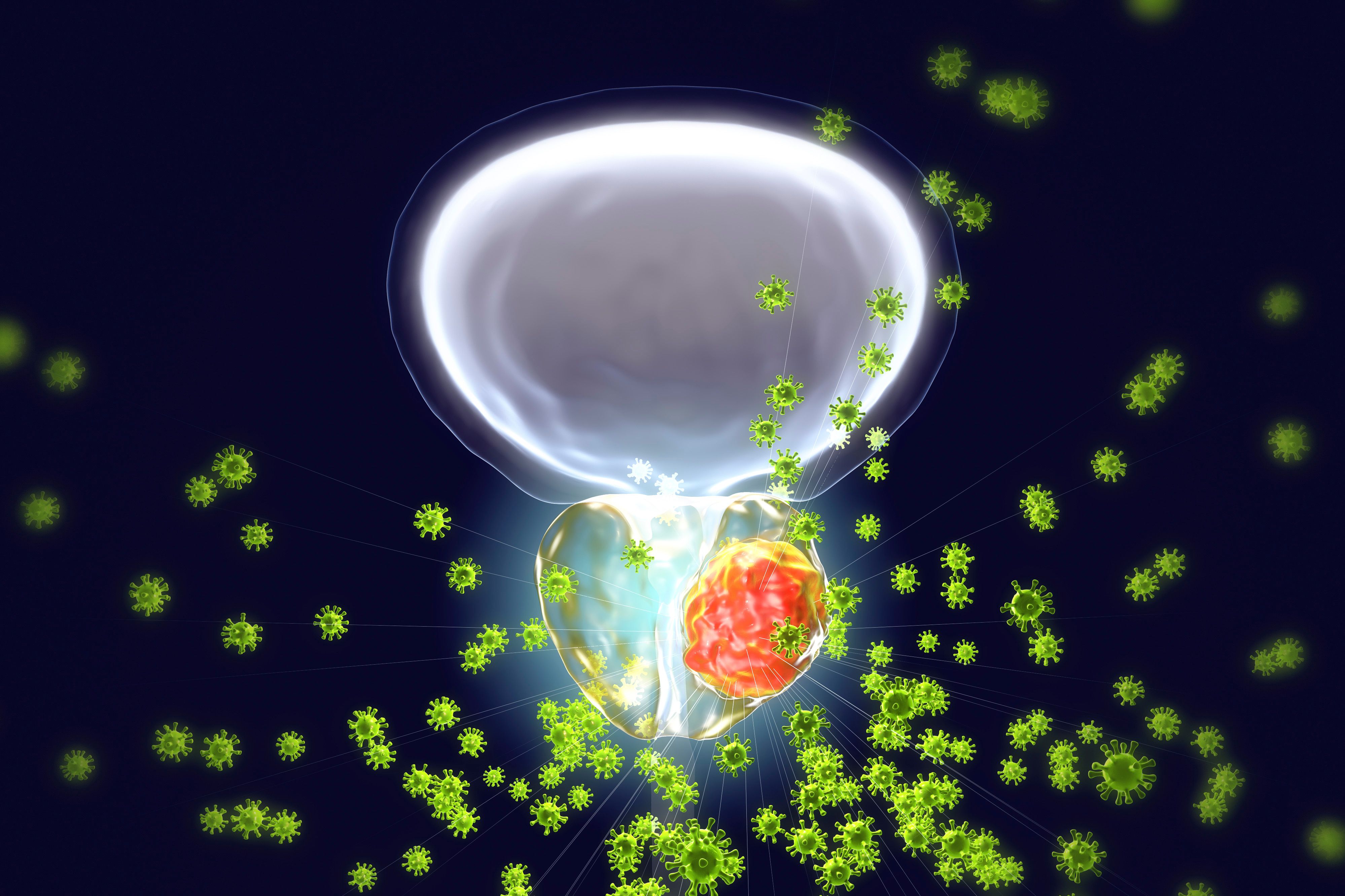Radiotherapy and Abiraterone Improve Outcomes in Low-Volume mCSPC
In an interview, Cedric Pobel, MD, further discussed the PEACE-1 trial and its findings.
Cedric Pobel, MD

The PEACE-1 trial (NCT01957436) revealed that adding radiotherapy to standard of care (SOC) and abiraterone significantly improved radiographic progression-free survival (rPFS) in patients with low-volume metastatic castration-sensitive prostate cancer (mCSPC).
The PEACE-1 study was an open-label, randomized, controlled, phase 3 trial conducted across 77 hospitals in Europe. The trial utilized a 2 × 2 factorial design and enrolled 1173 male patients with de novo mCSPC, who were randomly assigned to 1 of 4 treatment arms: SOC alone, SOC plus abiraterone, SOC plus radiotherapy, or SOC plus both radiotherapy and abiraterone.
Patients treated with SOC plus abiraterone and radiotherapy experienced a median rPFS of 7.5 years, compared with 4.4 years in those receiving SOC and abiraterone alone (adjusted hazard ratio [HR] 0.65; P =.019). However, radiotherapy did not show a significant benefit for rPFS in patients not receiving abiraterone.
For overall survival (OS), no statistically significant improvement was seen with the addition of radiotherapy across the study population. The median OS was similar between the SOC and SOC plus radiotherapy groups, with no substantial difference between those with low-volume metastatic disease (median OS 6.9 years vs 7.5 years, respectively; HR 0.98; P =.86).
Safety outcomes were consistent with previous studies, as the addition of radiotherapy did not significantly increase the occurrence of severe adverse events (grade ≥3), although certain toxicities such as hypertension and neutropenia were more commonly observed in the radiotherapy groups.
In an interview with Targeted OncologyTM, Cedric Pobel, MD, medical oncologist, PhD student, Institut de Cancérologie, Gustave Roussy, Paris, France, further discussed the trial and its findings.
Targeted Oncology: Can you discuss the design and objectives of the phase 3 PEACE-1 trial?
Pobel: The PEACE-1 trial was a paradigm shift in first-line treatment. The design consisted of 4 arms of treatment, standard-of-care with or without abiraterone and without radiotherapy. The results showed benefits in overall survival with the addition of abiraterone to castration and docetaxel.
What were the methods in design utilized in the study?
To explore our hypothesis, we retrieved paraffin-embedded biopsy samples from almost 600 patients. So far, we have performed 2 main analyses. The first analysis involved immunohistochemistry using 10 markers, which allowed us to define 5 phenotypes. Secondly, we performed next-generation sequencing using a restricted panel rather than whole-exome sequencing.
Conceptual image for viral etiology of prostate cancer: © Dr_Microbe - stock.adobe.com

What are the most recent findings to be presented from this trial?
We had 400 patients with immunohistochemistry data and around 190 patients with next-generation sequencing data. The patient characteristics were similar across cohorts. In terms of phenotypic data, we observed 2 outliers in overall survival: one group with double-negative tumors, but this included only 3 patients, so it is difficult to draw conclusions from them. At the lower end of the survival curve, we found a neuroendocrine phenotype with a negative and positive neuron marker, which had a clearly shorter overall survival. However, this group had only 5 patients, so interpretation is again limited. The majority of patients were in the AR-high or AR-low tumor categories, and their overall survival was similar. In contrast, the amphicrine patients had a slightly shorter overall survival.
When we analyzed the data based on each protein expression, we found that 10 patients with a negative tumor had significantly worse outcomes. Similarly, patients with synaptophysin-positive and chromogranin-positive tumors also had a worse prognosis. Surprisingly, around 25% of patients had at least one neuroendocrine marker among synaptophysin, CD56, and chromogranin A, and these patients had the worst prognosis as well. It is important to note that, despite these findings, no biomarker was found to be predictive of abiraterone benefit in these patients.
Looking at the genomic data, we observed a similar number of alterations to what has been previously described in [patients with] metastatic castration-sensitive prostate cancer. There were only a few alterations in DNA repair genes, as expected in this castration-sensitive setting. Patients with at least 2 alterations in genes like TP53 and PTEN had shorter overall survival, but this subgroup only included 9 patients, so the interpretation remains limited.
How do these results support the use of this treatment?
Well, these findings do change the standard of care in clinical practice. For all patients meeting the criteria, they should now receive the triplet therapy, which includes the addition of abiraterone to castration and docetaxel. What we observed in terms of prognostic factors, specifically the neuroendocrine features and the markers from immunohistochemistry, suggests that we may need to develop and include patients in clinical trials targeting these tumor subtypes. This could involve treatments aimed at these tumor features, possibly in combination with other hormonal therapies. However, this is more of a call for additional clinical trials focused on this specific subtype of tumor.
What future studies are necessary to build on the findings from PEACE-1?
We also have transcriptional analysis underway, and we will have the results soon to confirm these neuroendocrine findings at the gene expression level. Another perspective is to explore treating these patients upfront with a more effective treatment for those with non-neuroendocrine features or non-glandular differentiation.
REFERENCE:
Bossi A, Foulon S, Maldonado X, et al. Efficacy and safety of prostate radiotherapy in de novo metastatic castration-sensitive prostate cancer (PEACE-1): a multicentre, open-label, randomised, phase 3 study with a 2 × 2 factorial design. Lancet. 2024;404(10467):2065-2076. doi:10.1016/S0140-6736(24)01865-8
Survivorship Care Promotes Evidence-Based Approaches for Quality of Life and Beyond
March 21st 2025Frank J. Penedo, PhD, explains the challenges of survivorship care for patients with cancer and how he implements programs to support patients’ emotional, physical, and practical needs.
Read More